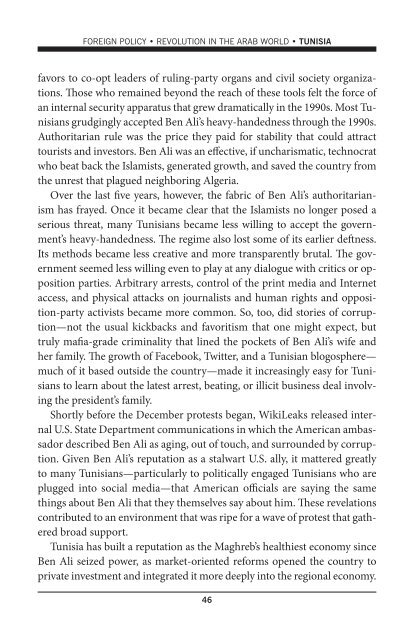Revolution in the Arab World - Observation of a lost soul Blog
Revolution in the Arab World - Observation of a lost soul Blog
Revolution in the Arab World - Observation of a lost soul Blog
You also want an ePaper? Increase the reach of your titles
YUMPU automatically turns print PDFs into web optimized ePapers that Google loves.
foreign policy • revolution <strong>in</strong> <strong>the</strong> arab world • Tunisia<br />
favors to co-opt leaders <strong>of</strong> rul<strong>in</strong>g-party organs and civil society organizations.<br />
Those who rema<strong>in</strong>ed beyond <strong>the</strong> reach <strong>of</strong> <strong>the</strong>se tools felt <strong>the</strong> force <strong>of</strong><br />
an <strong>in</strong>ternal security apparatus that grew dramatically <strong>in</strong> <strong>the</strong> 1990s. Most Tunisians<br />
grudg<strong>in</strong>gly accepted Ben Ali’s heavy-handedness through <strong>the</strong> 1990s.<br />
Authoritarian rule was <strong>the</strong> price <strong>the</strong>y paid for stability that could attract<br />
tourists and <strong>in</strong>vestors. Ben Ali was an effective, if uncharismatic, technocrat<br />
who beat back <strong>the</strong> Islamists, generated growth, and saved <strong>the</strong> country from<br />
<strong>the</strong> unrest that plagued neighbor<strong>in</strong>g Algeria.<br />
Over <strong>the</strong> last five years, however, <strong>the</strong> fabric <strong>of</strong> Ben Ali’s authoritarianism<br />
has frayed. Once it became clear that <strong>the</strong> Islamists no longer posed a<br />
serious threat, many Tunisians became less will<strong>in</strong>g to accept <strong>the</strong> government’s<br />
heavy-handedness. The regime also <strong>lost</strong> some <strong>of</strong> its earlier deftness.<br />
Its methods became less creative and more transparently brutal. The government<br />
seemed less will<strong>in</strong>g even to play at any dialogue with critics or opposition<br />
parties. Arbitrary arrests, control <strong>of</strong> <strong>the</strong> pr<strong>in</strong>t media and Internet<br />
access, and physical attacks on journalists and human rights and opposition-party<br />
activists became more common. So, too, did stories <strong>of</strong> corruption—not<br />
<strong>the</strong> usual kickbacks and favoritism that one might expect, but<br />
truly mafia-grade crim<strong>in</strong>ality that l<strong>in</strong>ed <strong>the</strong> pockets <strong>of</strong> Ben Ali’s wife and<br />
her family. The growth <strong>of</strong> Facebook, Twitter, and a Tunisian blogosphere—<br />
much <strong>of</strong> it based outside <strong>the</strong> country—made it <strong>in</strong>creas<strong>in</strong>gly easy for Tunisians<br />
to learn about <strong>the</strong> latest arrest, beat<strong>in</strong>g, or illicit bus<strong>in</strong>ess deal <strong>in</strong>volv<strong>in</strong>g<br />
<strong>the</strong> president’s family.<br />
Shortly before <strong>the</strong> December protests began, WikiLeaks released <strong>in</strong>ternal<br />
U.S. State Department communications <strong>in</strong> which <strong>the</strong> American ambassador<br />
described Ben Ali as ag<strong>in</strong>g, out <strong>of</strong> touch, and surrounded by corruption.<br />
Given Ben Ali’s reputation as a stalwart U.S. ally, it mattered greatly<br />
to many Tunisians—particularly to politically engaged Tunisians who are<br />
plugged <strong>in</strong>to social media—that American <strong>of</strong>ficials are say<strong>in</strong>g <strong>the</strong> same<br />
th<strong>in</strong>gs about Ben Ali that <strong>the</strong>y <strong>the</strong>mselves say about him. These revelations<br />
contributed to an environment that was ripe for a wave <strong>of</strong> protest that ga<strong>the</strong>red<br />
broad support.<br />
Tunisia has built a reputation as <strong>the</strong> Maghreb’s healthiest economy s<strong>in</strong>ce<br />
Ben Ali seized power, as market-oriented reforms opened <strong>the</strong> country to<br />
private <strong>in</strong>vestment and <strong>in</strong>tegrated it more deeply <strong>in</strong>to <strong>the</strong> regional economy.<br />
46




